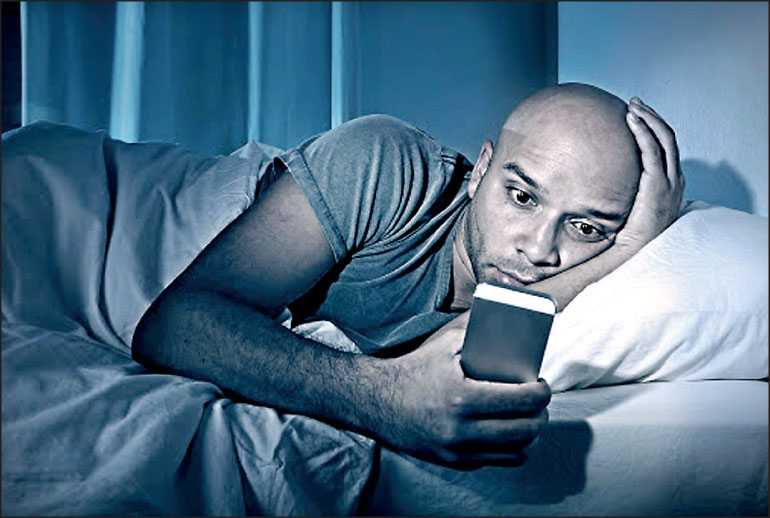Monday Mar 02, 2026
Monday Mar 02, 2026
Wednesday, 13 May 2020 00:00 - - {{hitsCtrl.values.hits}}

The bluer and brighter the light, the higher it’s likely to delay melatonin release resulting in delayed sleep and ultimately damaged sleep patterns
By S. Ruwani Weerasinghe
What is the last device you touch before going to bed? For many of us it is our mobile phone. We might use it to set our alarm, check last minute email and ‘just 5-min in Facebook’. What we don’t know is using any type of screens (especially mobile phones) before bedtime doesn’t only affect our sleeping cycle, but also hampers our memory, creativity and learning abilities.
Sleep is only for the lazy?
By default, we tend to call more ‘sleepy’ people lethargic. But sleepiness and constant tiredness can be a sign of underlying health issues. As per Sleep foundation (2020), 50-70 million Americans are affected by chronic sleep disorders and intermittent sleep problems that can significantly diminish health, alertness and safety. Also, sleep deprivation is leading to less efficient learning, higher emotionality, increased anxiety, and a less efficient brain (Rosen, 2015). In addition, in 2017 in USA sleep deprivation costs economy with reduced productivity and increased healthcare expenses losing $ 411 billion (2.2.8% of GDP) (National Geographic, 2020).
In the modern non-stop working era, some are hailed for needing less sleep than others and often showcased as ‘efficient’. But what is disregarded is that anyone who regularly sleeps less than six hours a night has an elevated risk of depression, psychosis and stroke (National Geographic, 2018). It has been discovered that a lack of sleep will even erode the very fabric of biological life itself, your DNA genetic code affecting your immunity health (Walker, 2019). Of course, amid a global pandemic, the last thing we need is a deficient immunity!
Hence the benefits of sleep are endless and cannot be stressed upon much as we see an increase in studies focus on effect of sleep deprivation; mentally, physically and economically.
Why ‘No screens’ policy before bedtime?
Melatonin, the hormone produced in the pineal gland of the brain is the ‘regulator’ of sleep cycles. It assists to regulate your body’s internal clock by signalling time of the day. Unfortunately, devices like mobiles that emit ‘blue light’ are the archenemy of melatonin. The bluer and brighter the light, the higher it’s likely to delay melatonin release resulting in delayed sleep and ultimately damaged sleep patterns.
“Sleep is the best meditation” – Dalai Lama
So, what can you do to have your sleep as a meditation? According to Matt Walker – Sleep scientist (2019), it is vital to avoid screens at least one hour before your bedtime. Also maintaining ‘sleep regularity’ is essential, going to bed and waking up at the same time irrespective on a weekend or a weekday.
Therefore, it’s time for us to view sleep as an investment rather than a liability. It should not be a debt to be paid later in life from our valuable mental and physical health. As it should not be an ‘optional lifestyle’ but a biological necessity. While we face COVID-19, the greatest global pandemic in the 21st century so far, our need to sleep should not be a factor to compensate with few minutes of screen time. Although our devices are mechanisms to connect to outside information, those should not be a catalyst to disconnect us from our mental and physical wellbeing.
(The writer can be contacted via: [email protected].)
References:
National Geographic Society. (2018). While We Sleep, Our Mind Goes on an Amazing Journey. Available: https://www.nationalgeographic.com/magazine/2018/08/science-of-sleep/. Last accessed 7th May 2020.
Rosen, L. (2015). Relax, Turn Off Your Phone, and Go to Sleep. Available: https://hbr.org/2015/08/research-shows-how-anxiety-and-technology-are-affecting-our-sleep. Last accessed 7th May 2020.
SLEEP FOUNDATION. (2020). Sleep Studies. Available: https://www.sleepfoundation.org/articles/sleep-studies. Last accessed 7th May 2020.
Walker, M. (2019). Sleep is your superpower. Available: https://www.ted.com/talks/matt_walker_sleep_is_your_superpower/transcript?language=en. Last accessed 7th May 2020